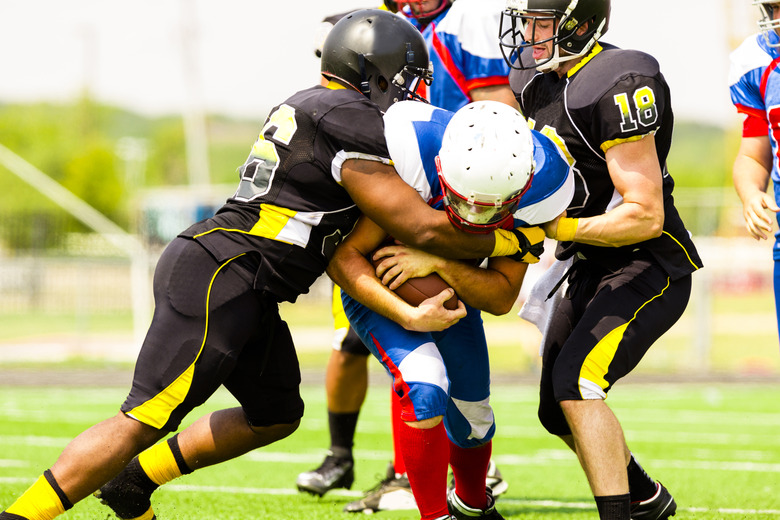Your Brain On: A Concussion
More than 3 million people are diagnosed with concussions every year, with many more going undiagnosed. You might've heard about the dangers of concussions – like how they can damage your brain over time or result in permanent brain injury.
What is a Concussion?
What is a Concussion?
A concussion is a type of traumatic brain injury (TBI). Concussions are caused by blows, hits, jolts or other impacts to the head. When this happens, it causes your brain to jostle and move around inside the skull, sometimes hitting the side of your skull.
These impacts and movements can alter your brain chemistry and damage brain cells. No matter how the movement or jostling of the brain occurs, the result is referred to as a concussion.
Concussion Symptoms
Concussion Symptoms
Concussions are not usually life-threatening, which is why they're often referred to as "mild" compared to other types of brain injuries. However, the symptoms themselves can be seriously detrimental and cause life-long issues.
Common initial symptoms include:
- Headache
- Blurry vision
- Nausea & vomiting
- Confusion or fogginess
- Temporary loss of consciousness
Other symptoms can appear latter. These include:
- Lack of concentration
- Memory issues
- Irritability
- Mood swings and/or changes
- Depression
- Loss of balance
- Fatigue
Most of these symptoms will resolve in a few days or weeks.
What Happens to the Brain?
What Happens to the Brain?
Concussions can be caused by any type of bump, jolt, shaking or impact to the head or body. Some common causes of concussions are:
- Car accidents
- Sports-related injuries
- Falls
When the brain is jostled around, it can hit the side of the skull, which can lead to bruising. The impact can also cause the brain to chafe along the side of the skull, shearing, stretching or tearing your nerve tissue. It's this damage that leads to the symptoms and effects of the concussion.
Concussion Treatments
Concussion Treatments
Unfortunately, there is no medicine you can take to "cure" a concussion. Just like a bruise on another part of your body, you simply have to wait for it to heal over time.
Concussion treatments mostly involve over-the-counter pain medications and resting – physically and mentally. You'll likely be advised not to play any sports or do physical activity until the concussion symptoms have faded. You'll also be advised to refrain from mentally taxing activities and looking at screens (phones, televisions, etc).
Why Children and Adolescent Concussions are Serious
Why Children and Adolescent Concussions are Serious
While all concussions should be treated seriously, concussions in children and adolescents need extra attention. Because their brains are still developing, any type of damage (like a concussion) can permanently alter the process.
Repeated concussions and brain injuries during childhood have been linked to post-concussion syndrome (prolonged concussion symptoms that can last for months or years after the injury), permanent memory issues, personality changes and permanent brain damage.
Long-Term Effects of Repeated Concussions
Long-Term Effects of Repeated Concussions
Repeated concussions are another concern that can lead to serious and long-lasting issues. This is made worse by the fact that it's easier to become concussed once you've already sustained (or currently have symptoms of) a concussion.
Chronic Traumatic Encephalopathy, more commonly referred to as CTE, is a degenerative brain disease that occurs after sustaining multiple concussions or other types of traumatic brain injuries. It's often seen in professional athletes in contact sports like boxing and football. However, anyone who sustains multiple concussions could develop CTE down the line.
What is CTE? It includes many symptoms of concussions with increasing severity and no true treatment. A brain with CTE deteriorates over time, thus reducing your brain cells and nerve tissues. This leads to permanent brain damage and problems including:
- Severe headaches
- Extreme impulsivity
- Depression and other mental health issues
- Early and rapid onset of dementia
- Memory loss
- Impaired judgement
- Behavioral changes
Cite This Article
MLA
Walsh, Elliot. "Your Brain On: A Concussion" sciencing.com, https://www.sciencing.com/what-is-a-concussion-13724511/. 11 February 2020.
APA
Walsh, Elliot. (2020, February 11). Your Brain On: A Concussion. sciencing.com. Retrieved from https://www.sciencing.com/what-is-a-concussion-13724511/
Chicago
Walsh, Elliot. Your Brain On: A Concussion last modified March 24, 2022. https://www.sciencing.com/what-is-a-concussion-13724511/
